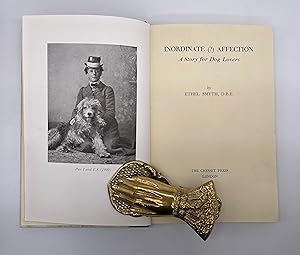About this Item
FIRST EDITION. 8vo + b/w frontis and plates. Quarter black cloth, lettered in silver, grey marbled paper boards. Bruising and wear to extremities, nicks to head of spine and corners, stain and bald patch to bottom board. Top edge faintly spotted. Occasional light fox spots, else, clean, bright and tight. Good+ Nevertheless, a pleasing copy of Smyth's passionate, but grief-filled short book for fellow canophiles, featuring portraits of her beloved English sheepdogs, "the successive Pans," written not long after the death of Pan IV, "one of the noblest beings I have ever known". Dame Ethel Smyth (1858-1944), flamboyant English composer, memoirist and Suffragette, is perhaps best remembered for composing the Women's Social and Political Union's (WSPU) rousing anthem, 'The March of Women' (1911, lyrics by Cicely Hamilton). While she was the first female composer to be awarded a damehood, her loss of hearing in the early C20th, led her to invest her prodigious energies in writing (alongside golfing). Of her autobiographical works, Vita Sackville-West wrote: "she might have entitled her successive books ME ONE, ME TWO, ME THREE, and so on [.] All Ethel's books are about Ethel, from one point of Ethel's view or another". A lover of women, Smyth had a late, passionate friendship with Virginia Woolf in the 1930s, who recalled first seeing her at a concert in 1919: "I suppose I told you how I saw you years before I knew you? coming bustling down the gangway at the Wigmore Hall, in tweeds and spats, a little cocks feather in your felt, and a general look of angry energy, So thats Ethel Smyth!" (all citations in Raitt, 1988). Suzanne Raitt, 1988, 'The tide of Ethel': Femininity as narrative in the friendship of Ethel Smyth and Virginia Woolf. Critical Quarterly. Seller Inventory # 2800
Contact seller
Report this item
![]()
